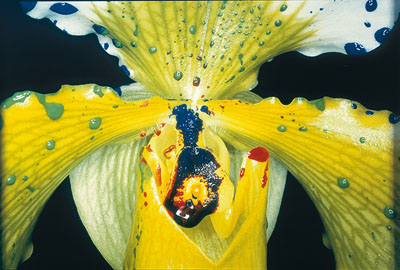
Untitled (From Painting Flowers), 2004
Cibachrome Print
50 x 60 cm
Courtesy Jablonka Galerie, Köln/Berlin
Foto: Matthias Langer, Braunschweig/Varel
© Nobuyoshi Araki
Araki, Miyamoto, Sugimoto: Japanische Fotografie der Gegenwart
Nobuyoshi Araki » Ryuji Miyamoto » Hiroshi Sugimoto »
Exhibition: 10 Nov 2007 – 24 Mar 2008
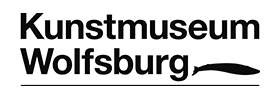
Kunstmuseum Wolfsburg
Hollerplatz 1
38440 Wolfsburg
+49 (0)5361-26690
info@kunstmuseum-wolfsburg.de
www.kunstmuseum-wolfsburg.de
Tue-Sun 11-18
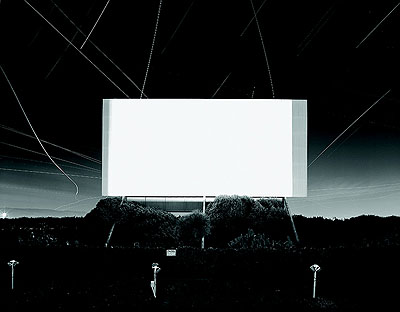
Union City Drive-In, Union City, 1993
Silbergelatine
50,8 x 61 cm
Courtesy Kunsthalle Bielefeld
Foto: Philipp Ottendörfer, Bielefeld/Frankfurt am Main
© Hiroshi Sugimoto
Araki, Miyamoto, Sugimoto: Japanische Fotografie der Gegenwart Ausgehend von der umfassenden Werkgruppe Nobuyoshi Arakis in der Sammlung des Kunstmuseum Wolfsburg zeigt das Kunstmuseum eine komplementäre Ausstellung fotografischer Arbeiten zu der in der Halle stattfindenden programmatischen Ausstellung "Japan und der Westen". Neben Nobuyoshi Arakis Arbeiten aus der Sammlung und weiteren aktuellen Beispielen seiner Tätigkeit wird eine Werkgruppe Ryuji Miyamotos, die nach dem Erdbeben 1995 in Kobe entstanden ist, mit Werkbeispielen Hiroshi Sugimotos aus seinen Werkreihen der "Seascapes", "Theaters" und der "Hall of Thirty Three Bays" präsentiert.
Taking as our starting point the extensive group of works by Nobuyoshi Araki in the collection of the Kunstmuseum Wolfsburg, we are showing an exhibition of photographs by Japanese artists as a complement to the programmatic exhibition "Japan and the West" being presented in the main hall. " Araki, Miyamoto, Sugimoto Contemporary Japanese Photography" illustrates key phenomena in Japanese aesthetics -- reduction, concentration and minimalism -- by focussing on three examples of contemporary Japanese photography. In addition to the photographs by Nobuyoshi Araki from the collection and other examples of his recent work, a group of photographs by Ryuji Miyamoto will be presented alongside works by Hiroshi Sugimoto. During their studies, both of these photographers were greatly influenced by the American art movements of Minimal art and Conceptual art. The defining principle of both Hiroshi Sugimoto's and Ryuji Miyamoto's work is seriality, whereby they pursue individual pictorial ideas over extended periods of time. Araki's work is strongly inspired by the everyday aesthetics of modern-day Japan and the particular feel of Japanese cities with all their light and dark sides. Sugimoto's series of rigorously reduced photographic images of "Theatres" and "Seascapes" invite the use of superlatives: it seems impossible for photographs to be more perfect, more reduced or more lucid than these. Sugimoto's poetic, breathtaking images are included in the most important collections of art throughout the world. Ryuji Miyamoto turns his camera on the suppressed aspect of the transitory nature of architecture. The Museum für Moderne Kunst in Frankfurt has a series of 34 photographs by Miyamoto in its permanent collection; these images were captured in the city of Kobe after it was almost completely destroyed by a massive earthquake. Miyamoto's photographs lend a distinctly sculptural quality to the damaged houses and the materiality of the shattered facades, storeys and walls.
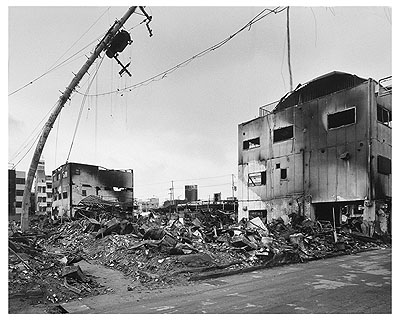
Kobe 1995 After the Earthquake, Nagata-ku, 1995
Schwarzweiß-Fotografie (Gelatin Silver Print)
50 x 60 cm
Museum für Moderne Kunst, Frankfurt am Main
Foto: Axel Schneider, Frankfurt am Main
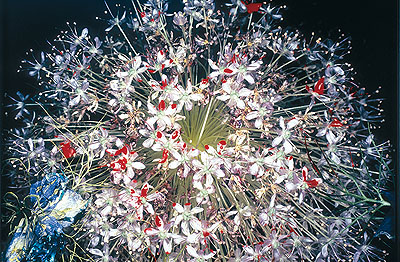
Untitled (From Painting Flowers), 2004
Cibachrome Print
50 x 60 cm
Courtesy Jablonka Galerie, Köln/Berlin
Foto: Matthias Langer, Braunschweig/Varel
© Nobuyoshi Araki